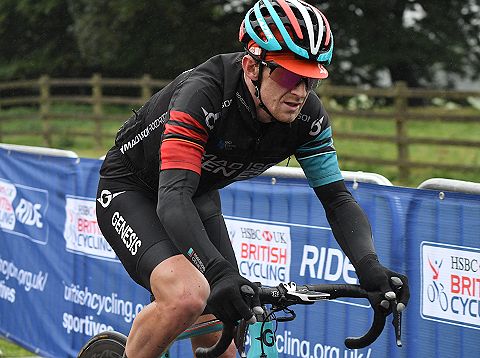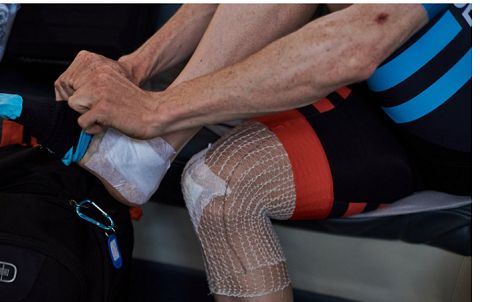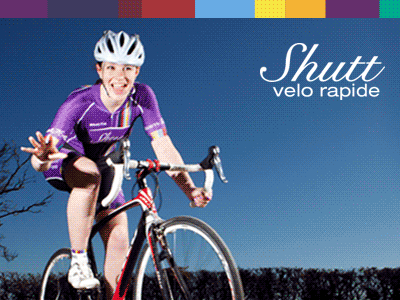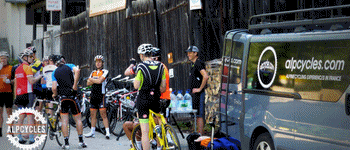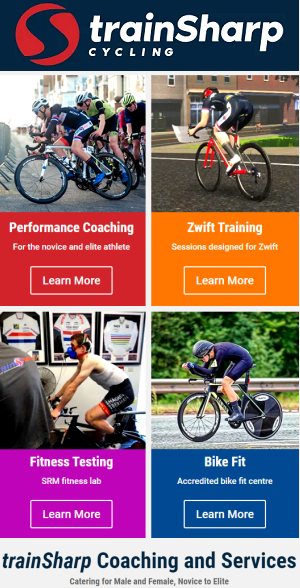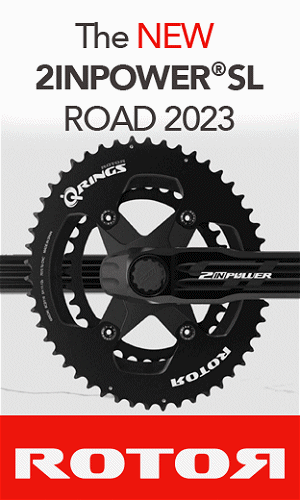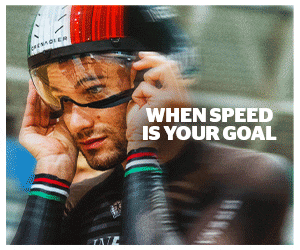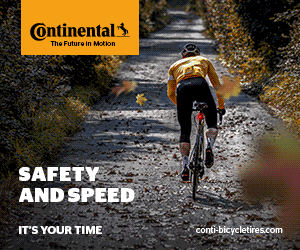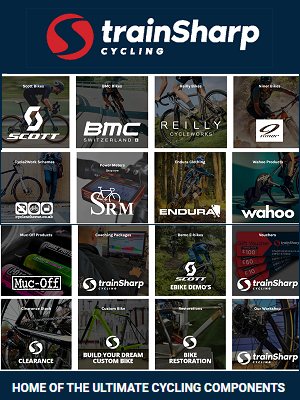Another insight into the riders for Madison Genesis in 2019 – in this weeks episode the team talks to long time team member Erick Rowsell
 |
Feature Interview: Erick Rowsell (Madison Genesis)
Find out more on the Madison Genesis team here
When Erick Rowsell finished eighth at the first edition of the Tour de Yorkshire back in 2015, it was a vindication of his class – but it was the character he showed in the three years of adversity that followed, that would define him as a pro bike rider.
Four comebacks to the top level, after three crashes in racing and training would have seen others contemplating retirement – but not Rowsell. A crash and broken arm while racing in Belgium counted him out of the 2015 Tour of Britain, while he was further disrupted by broken ribs sustained at the 2016 An Post Ras. Somewhat miraculously, Rowsell battled back to start the 2016 Tour of Britain, taking 15th on GC and third on a stage.
That winter, surgery to remove the metalwork from Rowsell’s arm went well, but left him behind schedule for 2017 and chasing race fitness. After a string of illness the tough decision to abandon the season and re-start in 2018 was made. Fifth at the CiCLE Classic, Rowsell came into the Tour de Yorkshire with confidence that his best form in 18-months was just around the corner.
It turned out to be a dry stone wall, two days of suffering and a broken ankle. Now fully recovered, Rowsell can refocus for another tilt at stage racing in 2019. In this feature, Erick talks training and what it takes to keep coming back and undying ambition.
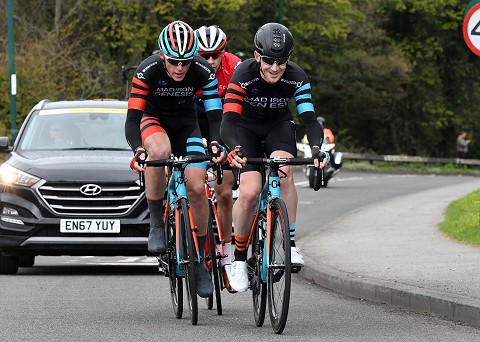
Q: How has your off season been?
Erick: Really good – I got married in December and then we had our honeymoon which was fantastic.
Q: Did you change your training to incorporate a bit of time off in December?
Erick: Yeah, I did a bit more in November than I usually would and that meant I could take a bit of time out in December. Of course it’s more strict in the season, because the race dates dictate things but over winter, as long as you’re doing the work and plan accordingly it’s fine. But if you’re doing one week on and one week off, that’s not ideal at all! Early in my career, I did 20 hours a week, for six weeks in a row. Now its three weeks on and then one off.
Q: So how has the training changed for you over the last five or eight years?
Erick: The way I used to do it was always do volume. Big volume weeks, blocks in November and December, 17 or 20 hours per week. There wasn’t much to it, it was just a real simple week. Three, four, five hours, then a day off and then four hours and five hours.
I didn’t do any efforts, all the riding was zone two and on the climbs zone three. It wasn’t bad training and it did work for me, I did and still do respond well to high volumes but times have changed a lot now. It’s not that I don’t do hours now – of course it happens on training camps. But it’s the recognition that endurance is only 50% the race. Races are won and lost in zone five and six, not in zone two. So you need to train those.
So today, you are doing less volume but more intensity. As a guess, I’d say that you’re racking up a similar TSS (measure of training stress) per week or month, but using different methods. Maybe you’re not doing that fifth hour now. Instead my training would be to do two and a half hours with some zone three and four and then the next day a steady four hours. It’s a lot different to the old mantra of keeping it in the small chainring until January.
Q: Do you do any double days or turbo trainer work?
Erick: I always prefer to go out but I have used the turbo a bit this winter as there are huge benefits to it. One example is that I’ve done a lot of slow cadence high torque sessions on the turbo. I don’t have the terrain near enough to where I live to do the session. So I do an hour on the road then another on the turbo with the torque efforts. It’s also good because you put it in erg mode* and it means you can’t drop off the power – if you do you will come to a standstill.
Q: Why are you doing those efforts?
Erik: I’m doing them because I just hate the gym environment. That’s not why I started cycling. So doing this is replicating the gym. I think it’s been done for a long time. The first time I saw it was with Netapp in 2013, all the Germans were doing it on a climb and only after that did I realise why. Of course also it helps for the Tour de Yorkshire! It’s the only race where the hills are so steep that you have to grind up them.
Q: Are you coached? How do you decide your training?
Erik: I used to do my own but then last year with my daughter Harriet being born, I got a coach. It was purely a time thing, but I have found other benefits as well. When I coached myself, I would always look at the numbers when I was training, but I didn’t do all the analysis afterwards. So now that is a big benefit. Now my coach looks back on all the data from races and previous years and they tries to find patterns in performance so they can help you adapt to the needs of the event.
So for example, maybe they look back and say that on stage four at the Tour of Britain was the highest TSS day of the race, and your power dropped off in the fourth hour – so you need to train for it. I wouldn’t ever have the time to look at it so specifically, for me I just saw it as a good day or bad day.
British pros also have to deal with doing crits as well as the big road races
Q: How would you review your 2018 season?
Erik: I think last year wasn’t a bad year. I was fairly consistent but it still did get interrupted at times. I took 10 days off in March when my daughter was born – she was in hospital so I had to be there. I got going again for the Tour de Yorkshire but I broke my ankle there. From then, I never really got back on top of my game. I was good and it was ten times better than 2017 but not as good as I should be.
But since my ankle recovered, I did all the races and the Tour of Britain with no interruptions. That was followed up with a good winter, so the build-up should be good going into this year.
Q: How hard has it been to deal with the injuries and the setbacks over the last three years?
Erik: Definitely, it’s been hard to deal with. You work so hard and something goes wrong – it could be tiny like a cold, or more major like a broken bone. I’ve had so many now that it feels like it’s just a part of the season but hopefully there won’t be any more now. It’s especially hard when the setbacks come at your big event. Our seasons aren’t long, we’re only racing for six months. You take a month out and there’s no time to get back.
… continued after advert
Q: What kept you motivated to keep going?
Erik: Mentally it’s been very hard and I have had some tough times. I have questioned whether I can do it and do I want to do it. What keeps me coming back is that I’m never going to end my career on a bad year. I want to finish – not any time soon – but I want to finish on a high. That’s what keeps me going. I want to do well in these big races again, racing for the top ten in the Tour de Yorkshire and Tour of Britain.
Q: Did you have to get any advice?
Erik: Not really, I talked to people but I think at that point, it’s as simple as you either want it or you don’t. On the physical side of things, having good support medically helps. On the mental side you either have it in you to keep going or you haven’t.
Q: Where does that resilience come from for you?
Erik: It’s my job, it’s what I’m paid to do. If I’m injured in April I get paid to December. If I’m getting paid I will keep going. Some people would get their feet up, take another week or two. I’m the opposite, I couldn’t live with just sitting there. I try my hardest to get back as fast as I can. And part of that is at some point if you back off, maybe you won’t get a contract. If you’re one of those that doesn’t give 100% people will pick up on it and you won’t be riding any more.
Q: When you crashed in the Tour de Yorkshire, how did you bring yourself to keep going?
Erik: I was taught from a young age, going back to being at British Cycling as a junior, that if you can get back on you always do. The only way out is in an ambulance. Especially in a stage race, you always get up because you never know the injuries until you finish and you might be fine the next day. Looking back it was a bit daft and had I had known there and then that I had a broken ankle, then I would have stopped!
But at the time you don’t know and I would have felt stupid and a thousand times worse if I had pulled out, gone to the hospital and to be told that there was nothing broken.
If my sock can go onto my foot, and if my foot can go into the shoe, then I can ride.
Q: What are your aims for the year?
Erik: I feel like I’ve given the same answer every year for the last four years! As always it’s the Tour de Yorkshire and the Tour of Britain. Also, it’s very motivating to have the national champion on our team. I think everyone on the team bus will get a boost, seeing him every day is nice and to contribute to Connor winning races in that jersey.
… continued after advert
Q: You were top-10 at the Tour de Yorkshire in 2015 – have you got unfinished business there?
Erik: I think it’s more of a case of having unfinished business with the Tour of Britain when it comes to the result. I’ve never been in the top-10 on GC there and I think I’m capable of that with a straight run at it.
That’s making the assumption that I’ll even get picked for the team, because it’s so difficult to call this year. Roger has a horrible job because it’s such a strong team. Usually you can pick your seven top riders at training camp, but right now it’s too hard to call. We’ve got a few that could go to Yorkshire – so going for GC there, it’s maybe not an option that I will have. If you have seven riders on the team, you can’t have three going for GC.
Q: Is that honesty and support something unique to the team?
Erik: It’s good to have the options and the honesty. That feeling in the team that everyone will get behind one person – and that security to know it will come back around. It feels like we’ve changed a lot in the off season – almost half of the riders are new but there are only two who I’ve never worked with before. I think they are all good guys and get the mentality that Madison already has.
Q: How has the scene changed over the last five years – especially in regards to opportunities to move up?
Erik: In terms of the UK scene – I don’t think much has changed in last few years, other than the strength in depth is better. Five years ago you could pick a handful who could perform. And now there are more people and more teams who can do it. When it comes to stepping up, cycling as a whole has changed. When I was an under-23, if you won stage of the Tour de Normandie then you’re guaranteed to get a pro contract.
Erick back when he was with ProConti team Netapp
In 2018, Tom Stewart won the race and didn’t have a look in, almost. Now you need to do ten-times more to get the same outcome. Right now, you might need to win stages at UCI races and/or be on the podium on GC. This goes alongside your age. If you’re 21 and you’re top five in those races, you get noticed. A bit older – anything over 25 and you need to do something special. The younger you are, the more chance you’ve got to develop – and that’s what the teams are looking for, to move you on again.
Connor in my opinion is easily World Tour level. So for him to be racing in the UK is going to raise the standard of UK racing. As the lower levels get stronger, the whole standard goes up.
Q: How conscious are you of improving yourself each year and stepping up to that ‘new normal’ level, in order to compete at the same standard?
Erik: For me I look at it from a perspective of the results I want to get. They are the same regardless of the level of my competitors and won’t change. Regardless of the level of racing the goals are the same. I just have to be better. Which is what everyone is trying to do every year.
Good luck to Erick in 2019 ….
* Erg Mode – If you do a workout with a smart trainer, you may have the option to use ERG mode. ERG mode is available on select smart trainers and sets the resistance to a specific wattage target based on your cadence instead of basing it on the course gradient (SIM mode).
Cycle Division’s Shop
Send your results as well as club, team & event news here
Other Results on VeloUK (including reports containing results)
- RR Result: East Cleveland Classic
- Features, Reports, Results
- Youth Result: Isle of Man Youth League
- Youth Result: Lawford Youth Series (Curborough) #2
- Crit Result: Full Gas Summer Circuit Series #2
- Crit Result: Ride Flux Spring Crit series #2
- Youth Result: Maindy Flyers Freewheel League 1
- Ribble Collective: Ride More in ’24
- Crit Result: Tameside Cycling Development Circuit Races 1
- Crit Result: 2024 West Thames League 1
- Startlist: The Drummond Trophy
- TT Result: VTTA Surrey/Sussex 10 mile TT
- EVENTS: Proper Northern Road Races – Round 2 Oakenclough
- TTT Result: Scorton TTT
- TT Result: Manchester & District TTA 25m TT
- TT Result: Stowmarket & District CC 15m TT
- TT Result: Paceline RT Sporting TT
- TT Result: Hereford & District Wheelers 25m TT
- RR Result: Yorkshire RRL #1
- Crit Result: Scottish Student Cycling Criterium Championships
- Events: Dave Peck Memorial
- TT Result: Blaydon CC Two Up TT
- TT Result: Kent CA 10m TT
- TT Result: Wessex RC 24m TT
- TT Result: Easterley RC 25m TT
- TT Result: Cranbrook CC 10m TT
- TT Result: Penzance Wheelers 12.5m TT
- TT Result: Fife Century RC 25m TT
- TT Result: Bramley Wheelers 10m TT
- TT Result: Mid Shropshire Wheelers 25m TT
- Youth Result: Hog Hill GP (National Youth Series)
- RR Result: Velo Club Venta Spring Road Race
- News: Women’s Tour of Britain
- Crit Result: Ennerdale Season Openers 2
- RR Result: NCRA Handicap RR (week 5)
- RR Result: Surrey League 2/3 (April 14)
- Report/Result: TLI Cycling Dave Astles Memorial Races
- RR Result: Cadence Junior Road Race
- Crit Result: Matlock CC Darley Moor Circuit Race #1
- Startlist: PB Performance Espoirs Road Race
- Crit Result: RBL Race Series 1 (MK Bowl)
Other News on VeloUK
- Ribble Collective: Ride More in ’24
- Startlist: The Drummond Trophy
- EVENTS: Proper Northern Road Races – Round 2 Oakenclough
- Events: Dave Peck Memorial
- News: Women’s Tour of Britain
- Startlist: PB Performance Espoirs Road Race
- East Cleveland Classic: Saint Piran Team
- News: New kit for Ribble Rebellion Riders
- Events: Halesowen Friday Track Nights
- Team News: Ribble Rebellion off to the USA
- News: Pedal Club Lunch (March)
- Rider News: Winning start for Billy Ladle
- News: CiCLE Classic 2024
- Startlist: Stars of the SW Men’s U23 RR
- Startlist: Danum Trophy 2024 (Nat B)
- Startlists: London Dynamo Road Races
- Startlist: La Fleche Waltonne Road Races (BMCR)
- Meet Ribble HoloRider
- Startlists: East Cleveland Classic 2024
- Former Winners: Lincoln Grand Prix
- Chris Lawless Joins Saint Piran Team
- Paracycling Track Worlds Day 4
- Para CyclingWorlds Final Day
- Startlist: National Youth Circuit Series Rd 1
- Report/Result: Azets Spring Classic
- Startlists: RCR Fat Creations Road Races
- Startlist: Capernwray Road Race (March 31)
- Team Report: Fensham Howes MAS Design Junior Team
- Team Report: CiCLE Classic Junior Men
- RIDER REPORTS – Zoe Parker (Solihull CC)
- GB News: Two World Titles for GB at Para Worlds
- Team News: Alba Development Road Team
- News: British Road Champs Return to NE
- THIS WEEKEND: Peaks Two Day is Back!
- News: Laura Kenny Retires
- Team News: Lee Valley Youth Cycling Team
- 2024/25 CYCLO-CROSS CALENDAR
- Startlist: Cardiff Ajax CC 10 Mile TT
- Startlists: 16th Gifford Road Races (Scotland)
- News: Ellingworth is new Tour of Britain Director






